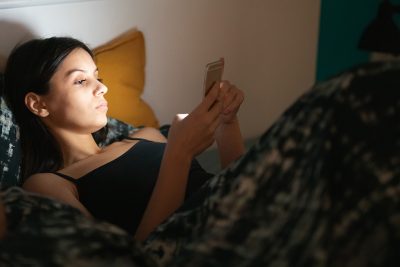
Voltaire once said, “Perfect is the enemy of good,” and nowhere is this aphorism more appropriate than when we talk about orthosomnia. In case you’ve never heard of it, orthosomnia is a term used to describe people who are hyper-focused on their sleep and sleep quality because their sleep trackers sounded the alarm.
What Is Orthosomnia?
In 2017, Dr. Kelly Glazer Baron and her colleagues published a report examining three cases of what they coined “orthosomnia.” In the case report, the doctors wrote, “We termed this condition ‘orthosomnia,’ with ‘ortho’ meaning straight or correct, and ‘somnia’ meaning sleep, because patients are preoccupied or concerned with improving or perfecting their wearable sleep data. We chose this term because the perfectionist quest to achieve perfect sleep is similar to the unhealthy preoccupation with healthy eating, termed orthorexia.”
Simply put, orthosomnia is a condition where people obsessively pursue optimal sleep based on data extrapolated from their sleep trackers.
Note: The content on Sleepopolis is meant to be informative in nature, but it shouldn’t take the place of medical advice and supervision from a trained professional. If you feel you may be suffering from any sleep disorder or medical condition, please see your healthcare provider immediately.
The Difference Between Orthosomnia and Insomnia
While the terms insomnia and orthosomnia are both closely related to sleep, they are different conditions. Insomnia is a sleep disorder, for one, while orthosomnia is something of a phenomenon within pop culture—similar to how the phrase “social jet lag” is gaining in popularity.
Insomnia is a common sleep disorder that affects about 10 percent to 30 percent of people worldwide. Difficulty falling or staying asleep are hallmarks of the disorder. While sleep is also at the heart of orthosomnia, in this case, it’s more about the pursuit of perfect sleep based on information from sleep trackers, which may or may not be reliable.
Moreover, orthosomnia is a relatively new phenomenon and not a formally recognized sleep disorder. Orthosomnia can run concurrent with insomnia, and it can even exacerbate insomnia symptoms.
Orthosomnia Symptoms
At this point, orthosomnia is not a well-defined sleep disorder—it’s more of a sleep phenomenon that’s becoming more and more common. Our understanding of its symptoms remain limited, but there are some behaviors that are commonly associated with orthosomnia.
The first (and perhaps most significant) behavior associated with orthosomnia is that those dealing with it often and mistakenly believe that their sleep trackers are, in fact, correct, so they end up spending an inordinate amount of time in bed attempting to improve that data.
Due to their preoccupation with improving sleep data, orthosomniacs may also experience the following symptoms while their fascination with “perfect sleep” persists:
- Difficulty falling asleep
- Difficulty staying asleep
- Fatigue
- Irritability
- Anxiety
- Problems with concentration and memory
- Unrefreshing sleep
- Depression
How Do Sleep Trackers Impact Orthosomnia?
In the last decade or so, wearable fitness devices have grown in popularity, and plenty of people use these devices to track their daily step counts or otherwise monitor their health. In fact, studies have shown that as much as 30 percent of adults in the U.S. use some sort of activity or fitness tracker. While these devices (which often include Fitbits, Apple watches, or other types of smartwatches) may be great for keeping you on top of your stand and step goals, their built-in sleep trackers tend to fall short.
Most sleep trackers are worn on the wrist and typically determine how much time you spend awake versus asleep by monitoring your movement as you sleep. The problem is those simple body movements don’t really prove much — everyone moves when they sleep.
As a matter of fact, multiple studies have shown that sleep trackers deliver unreliable results. Some overestimate sleep quality, while others overestimate sleep and underestimate wakefulness.
Ultimately, instead of empowering people to improve their sleep, sleep trackers are muddying the waters for many. According to Mar de Carlo, founder of the Association of Professional Sleep Consultants, “Trackers can absolutely lead to worse sleep and orthosomnia. While sleep tracking devices can be useful in some ways, they just engage the mind way too much and distract one from tuning in and being guided by the intelligence of their own body.”
De Carlo goes on to tell Sleepopolis that while it’s important to collect data to identify possible issues, find a way forward, and subsequently measure progress, the problem comes in when people find themselves with a tool to distract themselves and hyperfocus on. She goes on to note that sleep trackers, in particular, build upon people’s “fears or anxieties, which can lead to orthosomnia.”
Moreover, it’s likely that sleep trackers create a self-fulfilling prophecy of sorts. The trackers show inaccurate data that someone then tries to improve — most likely by spending more time in bed to improve that data. The problem here is that when you spend more time in bed than you should, that could have a counterproductive effect on your sleep health.
That doesn’t mean that sleep trackers are never helpful. Dr. Shelby Harris, Sleepopolis director of sleep health, notes that trackers can be a useful tool for people who don’t prioritize sleep. “Maybe you only get five hours of sleep per night or you just don’t make it a priority…a sleep tracker is a really good thing to point that out to you.”
However, like other experts, Dr. Harris cautions against relying too heavily on sleep trackers as a metric for measuring the amount and quality of your sleep. Thanks to the unreliability of sleep trackers, she’s seen patients who actually are sleeping well start to worry that they’re not getting enough sleep — because their tracker tells them otherwise.
“That actually can put more pressure on you to try and sleep better the next night,” she says. “Think about whether you’re someone who’s going to become more fixated on the tracker or whether you’re just using it to inform yourself about making some sleep changes.”
How Is Orthosomnia “Diagnosed”?
Because orthosomnia isn’t a diagnosable sleep disorder, there aren’t any established criteria for diagnosis. That said, when patients exhibit a radical reliance on sleep tracker data and a strong preoccupation with achieving perfect sleep, all signs point to orthosomnia.
“If someone struggles with orthosomnia (and since orthosomnia has traits of fixation and obsession), a thorough evaluation performed by a qualified professional is best,” says de Carlo. “A consultation with a certified, experienced sleep coach (who can refer out if necessary), a sleep doctor, or a combination of both, [may be necessary] depending on the severity of the orthosomnia.”
How to Manage Orthosomnia
The first line of defense against orthosomnia is to remember that sleep trackers are not entirely accurate. So beyond taking the information from your sleep tracker with a grain of salt, de Carlo offers the following best practices to help you keep orthosomnia in check.
- Let go of relying on tech devices for your sleep and rely more on mother nature; try connecting more with your physical body and with your environment.
- Get healthy [and safe] sunlight exposure daily, particularly in the morning. This will help regulate your circadian rhythm and sleep patterns.
- Try engaging in a consistent daily practice of yoga or meditation. Pair that with a breathing exercise to slow down your mind and relax your body.
- Reduce your screen time exposure, especially right before bed. Research shows two or more hours of screen time before bed can suppress melatonin production needed to fall asleep.
- Include pro-sleep foods into your daily nutrition intake. Certain foods (anti-sleep foods) disrupt and inhibit sleep, while other foods (pro-sleep foods) encourage and support sleep.
- Stay hydrated.
- Establish a daily calming bedtime ritual like taking a bath, dimming lights, reading a book, journaling, or listening to calming music.
- Invite a creative or supportive outlet to process your emotions. Having outlets like journaling, painting, dancing, singing, etc., are great ways to support your ability to process your emotions and let go of anxiety and worry, which can worsen orthosomnia.
- Maintain a consistent bed routine, and allow room for some flexibility.
The Last Word from Sleepopolis
Taking charge of your sleep health is never a bad thing, but doing so using inaccurate information could very well be. And while sleep trackers have grown in popularity over the years, their use and application still seem limited. Ultimately it’s probably best to rely on your own intuition and how you feel day to day when you need to gauge how good or bad your sleep actually is. If you wake up feeling rested and refreshed, then your sleep quality is probably fine. However, if you feel unrefreshed and tired when you wake up or notice frequent daytime sleepiness, you might have a bigger issue for which you may want to speak to your doctor.



























